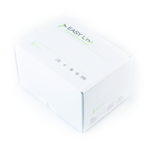| Line | Method & Sample | Product | Package Info |
|---|---|---|---|
| MOLgen | Clinical Specimens | MOLgen DNA HPV HCR genotype S1 (quantitative) Kit | Tests per Package: 96 |
| Human Papilloma Viruses | “Molgen DNA HPV HCR genotype (quantitative) S1 Kit” is an assay kit for the differential detection and quantitative determination of DNA of Human Papillomavirus types 16, 18, 31, 33, 35, 39, 45, 51, 52, 56, 58 and 59 by Real-Time PCR method | Code: ME184780 | Package Format: STR |

For Quantity Orders: Request a Quote
Please pay attention to the revision of the document that must be the same as the revision reported in the box label.
In case of discrepancy please contact our Customer Care e-mail: info@adaltis.net.
* Other document related to the product available at Documentation Centre and it is accessible for Adaltis distributors/partners after registration only.
“Molgen DNA HPV HCR genotype (quantitative) S1 Kit” is an assay kit for the differential detection and quantitative determination of DNA of Human Papillomavirus types 16, 18, 31, 33, 35, 39, 45, 51, 52, 56, 58 and 59 by Real-Time PCR method.
“Molgen DNA HPV HCR genotype (quantitative) S1 Kit”is designed for differential detection and quantitative determination of DNA of human papillomavirus (HPV) types 16, 18, 31, 33, 35, 39, 45, 51, 52, 56, 58 and 59 of high cancer risk isolated from clinical specimens using extraction kit: “MOLgen Universal Extraction Kit”.
Assay is based on real-time polymerase chain reaction (PCR) method with fluorescent detection of amplified product.
The kit contains reagents requiredfor 96 tests, including control samples.
The kit is validated for use with iQ iCycler, iQ5 iCycler (Bio-Rad, USA). The kit is compatible with other real-time PCR systems such as CFX96 (Bio-Rad, USA) and DT-96 (DNA-Technology, Russia).
“Molgen DNA HPV HCR genotype (quantitative) S1 Kit” is designed for the analysis of clinical materials (scrapings of the epithelial cells, semen, prostatic fluid, urine).
Real time PCR is based on the detection of the fluorescence, produced by a reporter molecule, which increases as the reaction proceeds. Reporter molecule is dual-labeled DNA-probe, which specifically binds to the target region of pathogen DNA. Fluorescent signal increases due to the fluorescent dye and quencher separating by Taq DNA-polymerase exonuclease activity during amplification. PCR process consists of repeated cycles: temperature denaturation of DNA, primer annealing and complementary chain synthesis.
Threshold cycle value - Ct – is the cycle number at which the fluorescence generated within a reaction crosses the fluorescence threshold, a fluorescent signal rises significantly above the background fluorescence. Increased fluorescence signal is due to the use of a specific for given agent’s DNA sequence DNA hybridization probe that in the course of reaction binds with one of the DNA strands, also providing additional specificity of the method. DNA probe comprises of a fluorescent dye at the 5’ end and of fluorescence quencher at the 3’ end which significantly reduces the fluorescence intensity. During the polymerase synthesis of the complementary strand, due to the 5’-3’ nuclease activity of Taq DNA polymerase the probe is cleaved from the 5’-terminus and separation of the quencher and the dye occurs, resulting in the increase the fluorescence signal due to accumulation of the reaction product. Fluorescence intensity detected depends on initial quantity of pathogen DNA template in the sample.
The use of Internal Control (IC) prevents generation of false negative results associated with possible loss of DNA template during specimen preparation. IC indicates if PCR inhibitors occur in the reaction mixture. IC template should be added in each single sample (including control samples) prior to DNA extraction procedure. The amplification and detection of IC does not influence the sensitivity or specificity of the target DNA PCR.
Note:IC is a component of the NA extraction kit of MOLgens series. Internal Control is added to the sample during NA isolation step and is used throughout the whole process of NA extraction, amplification, detection.
Analyzed samples are additionally assessed for the human HMBS gene DNA content in order to validate the quality of the material sampling and improve the reliability of the results of the quantitative determination of human papillomaviruses of high cancer risk (HPV HCR).
To analyze each sample for the content of HPV DNA half of the strip is used - the amplification is carried out in four tubes with RMM HPV HCR genotype (RMM1, RMM2, RMM3, RMM4) for detection of DNA of three of the 12 HPV types in each tube (see Table 1). Additionally one tube with RMM Sample Validation is used for the assessment of human HMBS gene DNA content in the sample.
Table 1
|
Test-tube |
HPV types |
|
RMM1 |
16, 18, 39 |
|
RMM2 |
33, 45, 56 |
|
RMM3 |
31, 35, 58 |
|
RMM4 |
52, 51, 59 |
|
Reagent |
Content |
|
Positive Control Sample (PC) (lyophilized) (based on plasmid DNA with integrated DNA fragments of human HMBS gene and DNA of human papilloma viruses, including HPV DNA types 16, 18, 31, 33, 35, 39, 45, 51, 52, 56, 58 and 59 of high cancer risk) |
2 vials |
|
Ready Master Mix (RMM 1,2,3,4) (lyophilized) |
4 x 96 tubes (tests) |
|
Ready Master Mix for PCR (RMM 5) (lyophilized) |
1 x 96 tubes (tests) |
|
Recovery Solution for Controls (RSC) |
1 vial, 4 mL |
|
Number of tests |
96 |
|
Code |
ME184780 |
Need assistance to make an order? Contact Sales & Orders Centre order@adaltis.net.
For Application Support application@adaltis.net